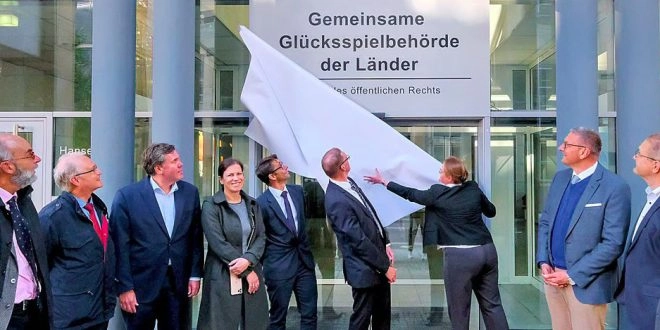The leadership of Germany’s Gluecksspiel (GGL) is ‘ready to go’, Board Member Benjamin Schwanke has asserted to national stakeholders, six months into the federal gambling regulator’s operations.
In a series of updates this week, the GGL has provided an annual report into the workings of the German betting and gaming market since the imposition of the Fourth Interstate Gambling Treaty (GlüNeuRStv) in 2021 as well as during H1 2023.
New leadership
The regulator has also informed that there has been a leadership change. Udo Götze, State Secretary in the Thuringian Ministry of the Interior and Municipal Affairs, will take on Chairman duties from Jörg Sibbel, State Secretary in the Ministry of the Interior, Municipal Affairs, Housing and Sport of Schleswig-Holstein, on 1 July.
Götze commented: “All 16 states support the GGL with conviction. Regulating the transnational gambling market in Germany is a challenging task. The GGL can also be sure of the support of the sponsoring states under the chairmanship of the state of Thuringia.”
The change in Chairmanship of the Board of Directors, which serves as the supervisory and steering committee of the GGL, falls in line with a legislative requirement for shift in duties every year on 1 July.
The requirement states that chairmanship must change annually in alphabetical order of the sponsorship states. The Board of Directors consists of representatives of the ministries of the 16 federal lander (states) of Germany.
Reflecting on his time as Chairman, Sibbel said: “The role of Chairman of the Board of Directors fell into the transitional phase of responsibility for the regulation of the cross-border gaming market from the so-called Gaming Board of the States to the now uniform responsibility of the GGL.
“I see them in a good position to be able to carry out the tasks assigned to them in issuing permits and combating illegal gambling offers on the Internet, which is already clearly evident in the ongoing implementation. The colleagues in the GGL have the fullest trust of all sponsoring countries.”
Market performance back on track
The GGL views the German gambling market as being divided between 12 segments – horse racing betting, sports betting, online casino, online poker, land-based casino, gambling machines, state lotteries, state class lotteries, social lotteries, savings lotteries, commercial game brokerage of lotteries and virtual slot machines.
In 2022, this total cross-sector market recorded total gross-gaming revenue of €13.4bn, an increase of 33% from the year prior (2021: €10.1bn). According to the GGL’s analysis, the market has now returned to pre-COVID levels.
A vertical breakdown saw betting register GGR of €1.4bn, of which €1.3bn came from sports betting and the remainder from horse racing wagering.
Casino revenue, meanwhile, was €1.1bn, gambling machine revenue was €4.8bn and virtual slots and online poker combined revenue was €900m.
Lastly, the lottery segments reported €5.2bn, with DLTB lotteries the largest (€4.1bn), followed by social lotteries (€700m), savings lotteries (€300m) and class lotteries (€200m).
At the close of H1, there were 142 operators in Germany covering sports and horse racing betting, online poker and virtual slot machines as well as ‘various lotteries and commercial game brokerage’. There are currently 45 licence applications under review by the GGL.
GGL Board Member Ronald Benter said: “We can look back on a successful first half of 2023. We will continue along the path of consistent legal enforcement in the issuing of permits and supervision.
“The first court decisions confirm this. At the same time, we remain in dialogue with the industry regarding new challenges.”
Lastly, the GGL also provided an update on efforts against illegal gambling. The regulator explained that over 2000 websites were checked for illegal gambling or advertising for unlicensed products, with operators subsequently contacted.
The GGL believes that the impact of this has been seen in moves by affiliate sites to focus on legal offerings. Meanwhile, it has also continued working to ensure legal operators are compliant with GlüNeuRStv terms, pointing to the revoking ot Tipster.de’s licence as an example.
In 2022, the GGL identified 207 illegal operators, with 136 classified as ‘generalists’ due to offering more than one type of gambling, and 72 as ‘specialists’ focusing on particular products. Geographically, 37 came from an EU country and 147 from outside of the EU, of which 132 were from Curacao.
“We are successfully working together with all the key players in the fight against illegal gambling,” Benjamin Schwanke asserted.
“Here, too, we always keep an eye on new developments, such as camouflage as a competition. The judgement of the Munich Administrative Court in the spring shows that we are not powerless against it.”









